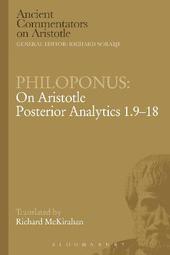
|
Philoponus: On Aristotle Posterior Analytics 1.9-18
Paperback / softback
Main Details
| Title |
Philoponus: On Aristotle Posterior Analytics 1.9-18
|
| Authors and Contributors |
By (author) Philoponus
|
|
Translated by Richard D. McKirahan
|
| Series | Ancient Commentators on Aristotle |
|---|
| Physical Properties |
| Format:Paperback / softback | | Pages:208 | | Dimensions(mm): Height 234,Width 156 |
|
| Category/Genre | Western philosophy - Ancient to c 500 |
|---|
| ISBN/Barcode |
9781472557971
|
| Classifications | Dewey:185 |
|---|
| Audience | | Professional & Vocational | |
|---|
|
Publishing Details |
| Publisher |
Bloomsbury Publishing PLC
|
| Imprint |
Bloomsbury Academic
|
| Publication Date |
10 April 2014 |
| Publication Country |
United Kingdom
|
Description
In this part of the Posterior Analytics, Aristotle elaborates his assessment of how universal truths of science can be scientifically explained as inevitable in demonstrative proofs. But he introduces complications: some sciences discuss phenomena that can only be explained by higher sciences and again sometimes we reason out a cause from an effect, rather than an effect from a cause. Philoponus takes these issues further. Reasoning from particular to universal is the direction taken by induction, and in mathematics reasoning from a theorem to the higher principles from which it follows is considered particularly valuable. It corresponds to the direction of analysis, as opposed to synthesis. This volume contains an English translation of Philoponus' commentary, a detailed introduction, extensive explanatory notes and a bibliography.
Author Biography
Richard McKirahan is Edwin Clarence Norton Professor of Classics and Professor of Philosophy at Pomona College, Claremont, California.
ReviewsThis book is an important publication that will certainly help to make the work of Philoponus better known. The translation - the first ever into any modern language - makes the Greek text accessible to those with little or no Greek and will be an indispensable tool for students and scholars of ancient thought. The notes clarify many strange passages and provide valuable information about the tradition Philoponus is working in. Moreover, the book is well edited.8 Thus, there can be no doubt that many scholars and students will find the book highly useful. -- Philpp Steinkruger, University of Cologne, Germany / K.U. Leuven, Belgium * Bryn Mawr Classical Review *
|